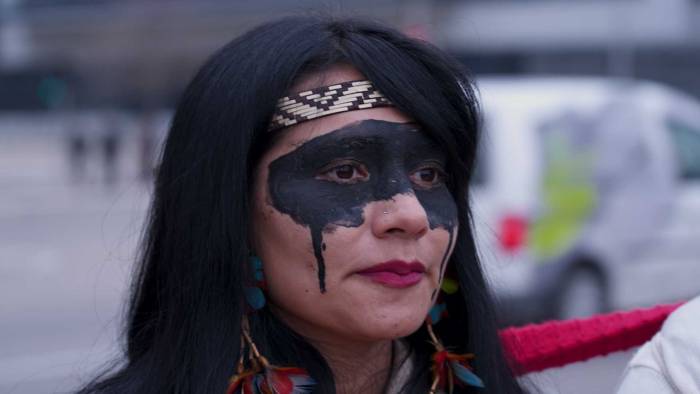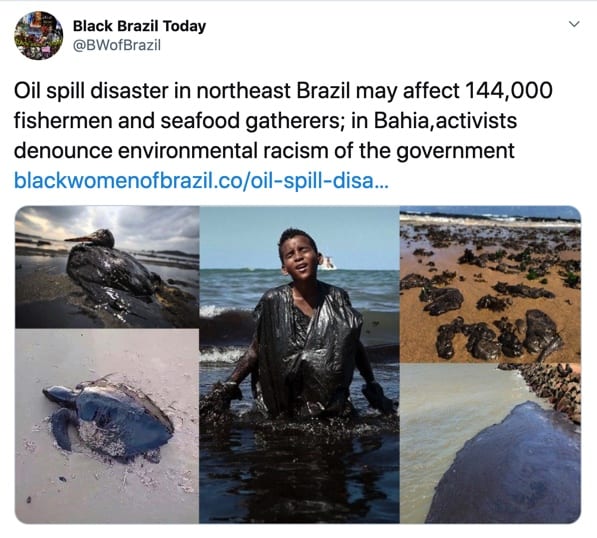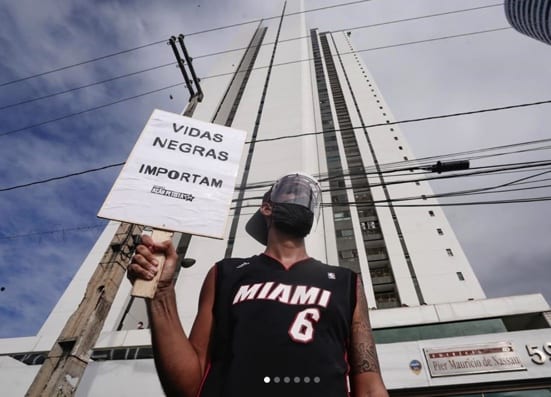At the end of 2019, when an oil spill of unknown origin spread over the coast of 11 Brazilian states, at least 60,000 families of fishermen, shellfish gatherers and tourism workers temporarily lost their sources of income and had to act on their own to promote cleaning the beaches, risking their own health given the inaction of national and local governments.
The vast majority of people affected by this spill consisted of residents from low-income areas or traditional communities, where Black and Brown populations predominate. 350.org and Indigenous leaders from Brazil even organised a demonstration to draw attention to the spill during COP25 in Madrid last December.
According to researchers of marine life and the human populations off the coast of Brazil, the federal government acted late and with little efficiency to support affected individuals with financial and health assistance, protect the mangroves from the spread, clean the beaches affected and find those responsible for the disaster.
In fact, the Brazilian government was never able to name the culprits, and the case went into oblivion a few months later, buried by other tragedies, such as the current pandemic.

An Indigenous leader from Brazil participating in a protest against the oil spill during COP25 in Madrid
This is only one of the many recent examples of how the impacts of environmental problems in Brazil disproportionately affect Black populations and Indigenous people. Some of my fellow Brazilians argue that these groups suffer more because, on average, they are poorer. However, in our country, the social profile does not exclude the racial profile. In other words, people who have low income and are black or Indigenous suffer doubly, because in our collective imagination their lives, their communities and the places where they live are worth less than those of white people.
The very fact that black people are, on average, poorer than white people is a facet of racism, as we have already discussed in previous posts in this series. It is no accident that poverty has a colour in Brazil. This is the result of a history of centuries of slavery and the absence of effective policies to correct the barbarities of our past.
As a result, the difference in treatment between rich and poor, Black people and white people, by the government and in general society, manifests itself clearly in environmental and climate issues. This is environmental racism.

On the coast, in the countryside, in forests and in cities
The successive cases of disregard for human rights by the fossil fuel industry show that companies in this sector are among the global champions in the perpetuation of environmental racism. Almost always, communities of Black, Brown and Indigenous people are the ones that suffer the most with oil spills in the sea and rivers, as happened in Brazil, in addition to the contamination of air, water and soil by coal and fracking.
However, the connection between racism and environmental impacts is not restricted to the fossil fuel industry. In the first three months of 2020, when storms flooded huge urban areas in the most densely populated states of Brazil (São Paulo, Rio de Janeiro and Minas Gerais), the black and brown families living on the outskirts of the cities paid the highest price and lost lives in episodes of landslides and drowning. In the first quarter of this year alone, thunderstorms left a sad toll of at least 100 deaths and destroyed the homes of over 11,000 people.
In the countryside and in the forests, it is no different. Ongoing invasions of Indigenous lands and fires in their surroundings deeply affect life in the Indigenous villages. So do the murders of community leaders in rural settlements and rubber plantations. All are manifestations of racism.
For some Brazilians, Indigenous cultures are an “obstacle to progress” — as if progress means deforesting entire regions and covering them with expansive monocultures. They are thought of as a “delay to be overcome” — but ironically if this “delayed culture” hadn’t already mastered the art of protecting forests even in regions where deforestation thrives, commercial agriculture and life in the big cities would be untenable.
When entire cultures are perceived by some as worthless, we end up naturalising the destruction of their homes, lands, cultures and lives. It is easier to say: “What a pity that they died!” and move on without changing anything. That is exactly why racism, this set of factors that make Black, Brown and Indigenous people less important to our society than white people, is at the root of the climate crisis.
Racism and climate crisis are totally linked
In addition to racism being a catalyst of environmental destruction — increasing society’s tolerance for catastrophe, so long as that catastrophe isn’t happening to White people — racism and climate emergency also share common roots. In both cases, people, companies and governments benefiting from the suffering of people of colour have actively tried – and are still trying – to avoid changes in our collective structure so that they continue to accumulate money and power. Human beings’ welfare is clearly not an issue for these guys.
To take an example, there is evidence that fossil fuel companies like Exxon knew for nearly four decades that emissions from burning oil, gas and coal would bring the world to the brink of collapse. For 40 years, they knew! But instead of confessing their knowledge and switching gears, they preferred to raise doubts about human influence on the climate to save a very profitable system working in their favour.
Here’s another example: Colonising countries, as well as companies and people who have benefited from human trafficking and slave labour throughout history, knew that they were implementing devastating systems for generations of Black, Brown and Indigenous people. However, selling human beings as goods and using their labor for free or in exchange for miserable wages was simply too lucrative for the lives of exploited people to matter whatsoever.
Even in 2020, when we look at the gap in the income and working conditions of white and black people in Brazil, it is clear that maintaining a system in which some groups of individuals are worth less than others remains a good deal for a few companies and governments.
No racial justice, no climate justice

A man holds a sign saying “Black Lives Matter” in Portuguese during a demonstration in Recife, Brazil. Photo: Léo Malafaia
In short, it is impossible to resolve the climate crisis as long as we still accept, anywhere in the world, that someone can be exploited or at greater risk of death because of the colour of their skin. This is what racism leads us to do, whether consciously or not.
Breathing the contaminated air around a coal plant, having respiratory problems due to pollution from burning fossil fuels in the metropolises or forest fires, suffering because of increasingly intense and unpredictable storms — none of this should be acceptable in the life of any individual.
As summarised by the young Brazilian journalist and black environmental activist Gabriel Perez dos Santos, black voices also have to matter in the climate movement. Without respect for everyone’s rights, there will be no climate justice.
This post is part of a series on Racism in Brazil, sparked by the Black Lives Matter protests in the U.S.